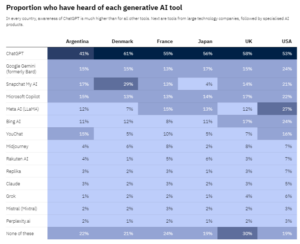

(iQoncept/Shutterstock)
People are less likely to believe news written by generative AI, according to a recent public opinion survey conducted by Reuters, but the news would be timelier and cost less for the publisher to produce. The online survey also found GenAI tools are not being as widely adopted by consumers as some people may think.
The Reuters Institute for the Study of Journalism (RISJ) at the University of Oxford contracted with YouGov to answer questions in two main areas: Determine how people are adopting GenAI broadly, and gauge their feelings towards GenAI-generated journalism specifically. The survey was conducted online in March and April, with 12,000 responses across Argentina, Denmark, France, Japan, the UK, and the US.
In their report on the findings, Richard Fletcher and Rasmus Kleis Nielsen note that more than half of the survey respondents in the six countries have heard of ChatGPT, making it the most widely recognized GenAI tool.
“That being said, frequent use of ChatGPT is rare, with just 1% using it on a daily basis in Japan, rising to 2% in France and the UK, and 7% in the USA,” Fletcher and Neilsen write. “Many of those who say they have used generative AI have used it just once or twice, and it is yet to become part of people’s routine internet use.”
There’s a large chunk of people–19% to 30% in each of the six countries–who have never heard of ChatGPT or any other GenAI tool for that matter. “While many have tried using various of them, only a very small minority are, at this stage, frequent users,” Fletcher and Nielson write.

The percentage of survey respondents who have heard of a GenAI tool in each country (Image courtesy RISJ)
Who’s using it? Predominantly young people, according to the survey, which found 56% of folks in the 18 to 24 year-old bracket say they have used ChatGPT at least once, compared to 16% of those aged 55 and over report having used it once or more.
About one-quarter (24%) of respondents across the six countries say they have used GenAI to get information, and slightly more (28%) say they have used it to generate media, including text, audio, code, images, and video. However, only 5% have used it to get the latest news, the RISJ says.
There is broad consensus among the survey-takers that GenAI will prove to be beneficial in areas like scientific research, healthcare, transportation, shopping, entertainment, education, food and nutrition, and climate change and sustainability. Areas where people have the most concern about GenAI impacts revolve around job security, news and journalism, equality, and cost of living, the survey found.
Most journalists are already using GenAI, according to RISJ’s opinion survey. On average, the survey-takers say that 43% of journalists are using GenAI to edit the spelling and grammar of an article and to translate stories into different languages, and 40% are using it for data analysis. The least likely GenAI tasks, the survey found, include creating an artificial presenter or author (an average of 17% believe this), writing the text of an article (27% believe this) and rewriting the same article for different people (28% believe this).
“In general, the order of the tasks in Figure 15 reflects the fact that people – perhaps correctly – believe that journalists are more likely to employ AI for behind-the-scenes work like spellchecking and translation than they are for more audience-facing outputs,” Fletcher and Nielsen write. “This may be because people understand that some tasks carry a greater reputational risk for journalists, and/or that the technology is simply better at some things than others.”
You can access the complete survey results here.
Related Items:
ChatGPT Overtakes Netflix in Web Traffic
OpenAI’s New GPT-3.5 Chatbot Can Rhyme like Snoop Dogg
March 26, 2025
- Quest Adds GenAI to Toad to Bridge the Skills Gap in Modern Database Management
- SymphonyAI Expands Industrial AI to the Edge with Microsoft Azure IoT Operations
- New Relic Report Reveals Media and Entertainment Sector Looks to Observability to Drive Adoption of AI
- Databricks and Anthropic Sign Deal to Bring Claude Models to Data Intelligence Platform
- Red Hat Boosts Enterprise AI Across the Hybrid Cloud with Red Hat AI
March 25, 2025
- Cognizant Advances Industry AI with NVIDIA-Powered Agents, Digital Twins, and LLMs
- Grafana Labs Unveils 2025 Observability Survey Findings and Open Source Updates at KubeCon Europe
- Algolia Boosts Browse with AI-Powered Collections
- AWS Expands Amazon Q in QuickSight with New AI Scenarios Capability
- Komprise Automates Complex Unstructured Data Migrations
- PEAK:AIO Chosen by Scan to Support Next-Gen GPUaaS Platform
- Snowflake Ventures Deepens Investment in DataOps.live to Advance Data Engineering Automation
- KX Emerges as Standalone Software Company to Make Temporal AI a Commercial Reality
- PAC Storage Unveils 5000 Series Data Storage Solutions
March 24, 2025
- Tessell Introduces Fully Managed Database Service on Google Cloud
- Datavault AI Joins IBM Partner Plus to Transform AI-Driven Data Monetization
- Cerabyte Unveils Immutable Data Storage for Government Customers
- Provenir Highlights AI-Driven Risk Decisioning in Datos Insights Report
- Algolia Showcases Powerful AI-Driven Search at ShopTalk Spring 2025
- StarTree Awarded 2025 Confluent Data Flow ISV Partner of the Year – APAC
- PayPal Feeds the DL Beast with Huge Vault of Fraud Data
- OpenTelemetry Is Too Complicated, VictoriaMetrics Says
- When Will Large Vision Models Have Their ChatGPT Moment?
- The Future of AI Agents is Event-Driven
- Accelerating Agentic AI Productivity with Enterprise Frameworks
- Your Next Big Job in Tech: AI Engineer
- Data Warehousing for the (AI) Win
- Nvidia Touts Next Generation GPU Superchip and New Photonic Switches
- Krishna Subramanian, Komprise Co-Founder, Stops By the Big Data Debrief
- Alation Aims to Automate Data Management Drudgery with AI
- More Features…
- IBM to Buy DataStax for Database, GenAI Capabilities
- Clickhouse Acquires HyperDX To Advance Open-Source Observability
- NVIDIA GTC 2025: What to Expect From the Ultimate AI Event?
- Excessive Cloud Spending In the Spotlight
- EDB Says It Tops Oracle, Other Databases in Benchmarks
- Databricks Unveils LakeFlow: A Unified and Intelligent Tool for Data Engineering
- Google Launches Data Science Agent for Colab
- Meet MATA, an AI Research Assistant for Scientific Data
- CDOAs Are Struggling To Measure Data, Analytics, And AI Impact: Gartner Report
- Big Data Heads to the Moon
- More News In Brief…
- Gartner Predicts 40% of Generative AI Solutions Will Be Multimodal By 2027
- Snowflake Ventures Invests in Anomalo for Advanced Data Quality Monitoring in the AI Data Cloud
- NVIDIA Unveils AI Data Platform for Accelerated AI Query Workloads in Enterprise Storage
- Accenture Invests in OPAQUE to Advance Confidential AI and Data Solutions
- Qlik Study: 94% of Businesses Boost AI Investment, But Only 21% Have Fully Operationalized It
- Seagate Unveils IronWolf Pro 24TB Hard Drive for SMBs and Enterprises
- Gartner Identifies Top Trends in Data and Analytics for 2025
- Qlik Survey Finds AI at Risk as Poor Data Quality Undermines Investments
- Palantir and Databricks Announce Strategic Product Partnership to Deliver Secure and Efficient AI to Customers
- Cisco Expands Partnership with NVIDIA to Accelerate Enterprise AI Adoption
- More This Just In…



























